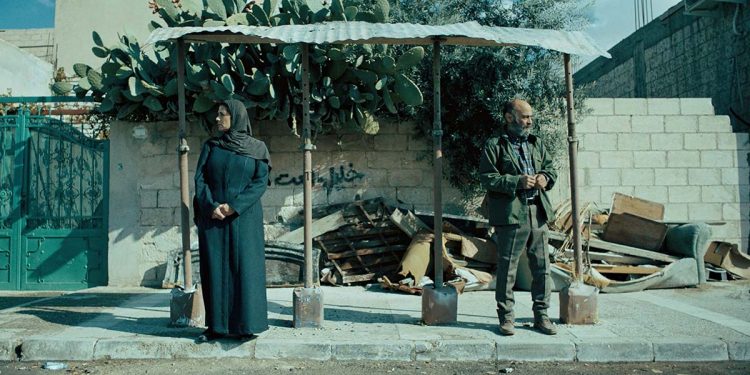There’s a brief sequence that follows the end-credits of the Nasser brothers’ “Gaza mon amour” that puts the previous 85 minutes into perspective. The moment, when it comes, is as earnest and casual like much that precedes it. But, as a conclusion to the film’s plot, its nonchalance in reaching an end feels charming and unusual both for its genre and for its subject. In a festival where entries from around the world have considered the political implications of the societies around them, “Gaza mon amour” develops and then slyly subverts the notions of our ideas of politics on film using a simple story of attempted romance to present a tender work of Palestinian cinema.

In an inspired creative decision, the Nasser brothers’ script, written in collaboration with Fadette Drouard, recognises that for people living in the self-governing Palestinian territory of Gaza, life still exists beyond the political implications of their existence. Issa, a laidback aging fisherman, is the perfect entry-point to their vision of this world. Issa lives a life of bachelor solitude even as he tries to stave off his well-meaning, but relentless, sister from meddling into his life. He goes out in the evening to fish, spends afternoons reminiscing with a younger friend and living a life of aimless – if pleasant – solitude. Two events interrupt this. The first is a chance encounter with Siham, a widowed dressmaker who plies her trade in the same market. Issa seems taken with her reticent grace. The second event is slightly more absurd. One night, while fishing, he catches a life-size, phallic statue of Apollo in his net – with a very prominent erection to boot. From there, Issa attempts to juggle both incidents – a hesitant wooing of Siham and a covert hiding of the statue. Both arcs develop with the constant appearance, and reappearance, of police, reminding us of the way that even the most minor moments in Gaza feel pronounced by the threat of something more uncertain.
The absurd appearance of the statue pronounces this and the absurdity turns unnerving when the police arrive at his house. Little by little the Nasser brothers remind us that amid the interpersonal pathologies of the film’s central plot, there is danger ever present. To its credit, “Gaza mon amour” distinguishes itself in Middle Eastern cinema because of its unwillingness to centralise that conflict and it instead restlessly nods to it throughout, while focusing on the smaller, more human aspects of Issa and his life. Rather than centre Issa, the script introduces Siham and her divorced daughter as a pair to counter Issa’s bachelor life, offering us a compelling mother-daughter perspective that develops the lives of these characters with a compelling warmth.
If films outside Hollywood over this year’s festival have seemed preoccupied with the slow breakdown of social justice around the world there is something impactful and necessary about a film like “Gaza mon amour” which acknowledges the political while still remembering the small, human, person-to-person stories that go on amidst the chaos. It’s this clear-eyed acknowledgement of the modesty of the film’s human desires that make the brief interludes of the society’s uncertain social construct more pronounced. The Kafkaesque recurring police presence is both unnerving and ridiculous but no less dangerous for that.
The film sets up the central schism between the old and young generation. A young man, Issa’s friend, represents the youth whose only vision of a life is out of Gaza. Siham’s divorced daughter walks around with the same note of cynicism. For Issa, and those of his generation, migration eschews the possibilities and instead he clings to his joy in the tiniest of moments. It’s that central idea of clinging to joy that establishes the tentative romance with Siham, which is more gestured to than represented. That the Nasser brothers decline to qualify the romance is not a non-commitment to it, but a realisation that in a nation built on the fickle and uncertain, clinging to even the slenderest whisp of happiness is all that one can do.
So, “Gaza mon amour” becomes impactful for the ways it seems to resist building to a crescendo. The film’s most seismic declaration happens in the last scene before the credits and resists spectacle by being delivered with almost a wan sense of casualness. That eschewing of melodrama feels revolutionary. Where another perspective of life in the Middle East may have focused on sensationalism, “Gaza mon amour” is content to meet these characters – not as symbols of life in a politicised nation – but as people with human-sized problems, grasping for the moments of joy to get through the day.
“Gaza mon amour” played in the Discovery section of TIFF in 2020 and won The Network for the Promotion of Asian Cinema (NETPAC) prize for being a ‘a heartwarming, thought-provoking and poetic tale of unspoken emotions portraying daily life in Gaza.’









